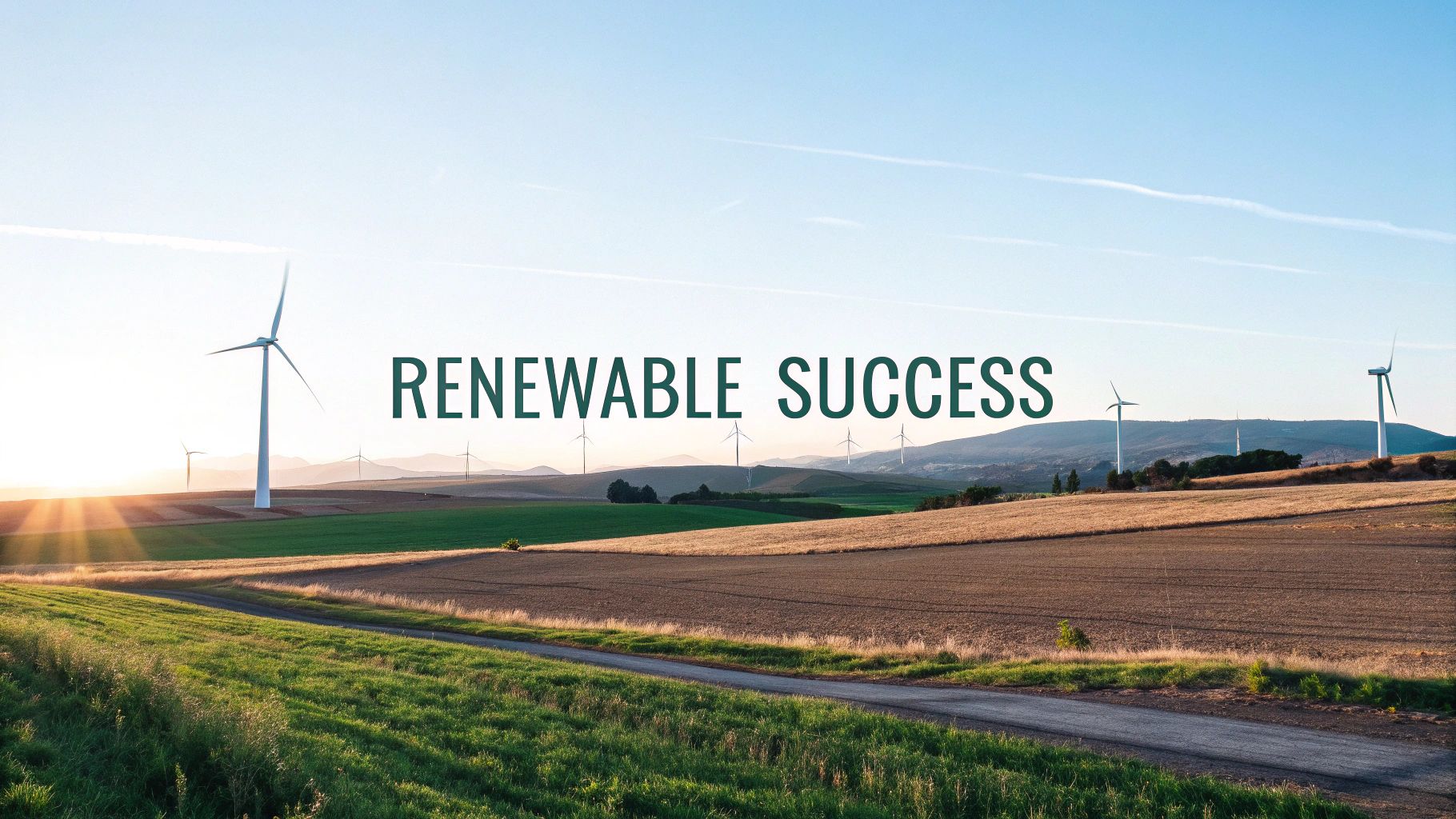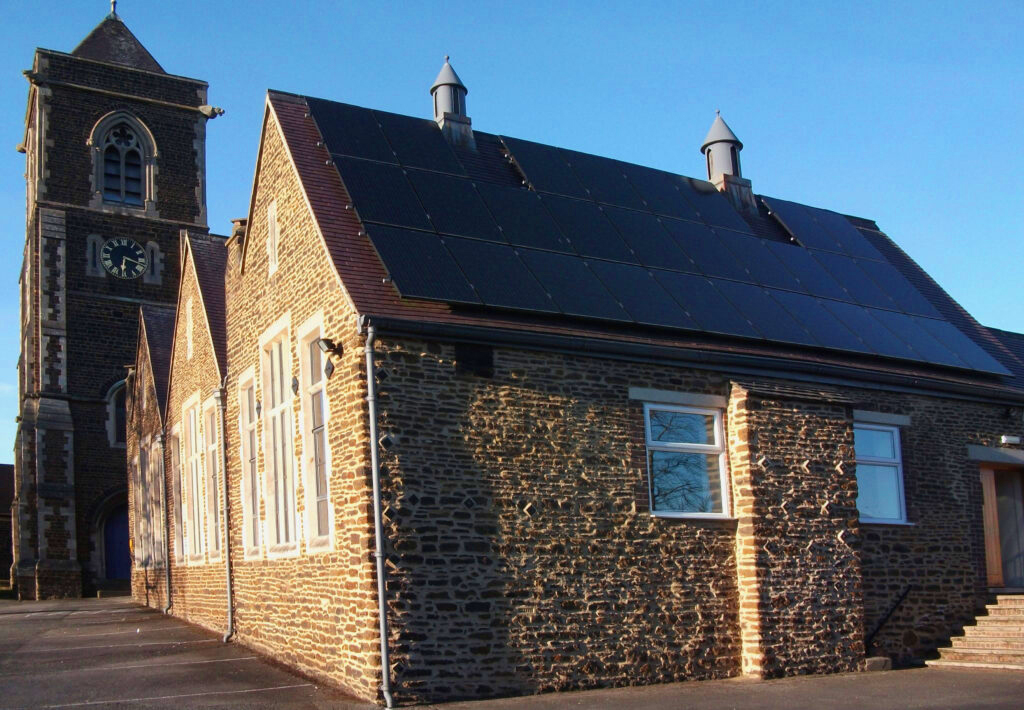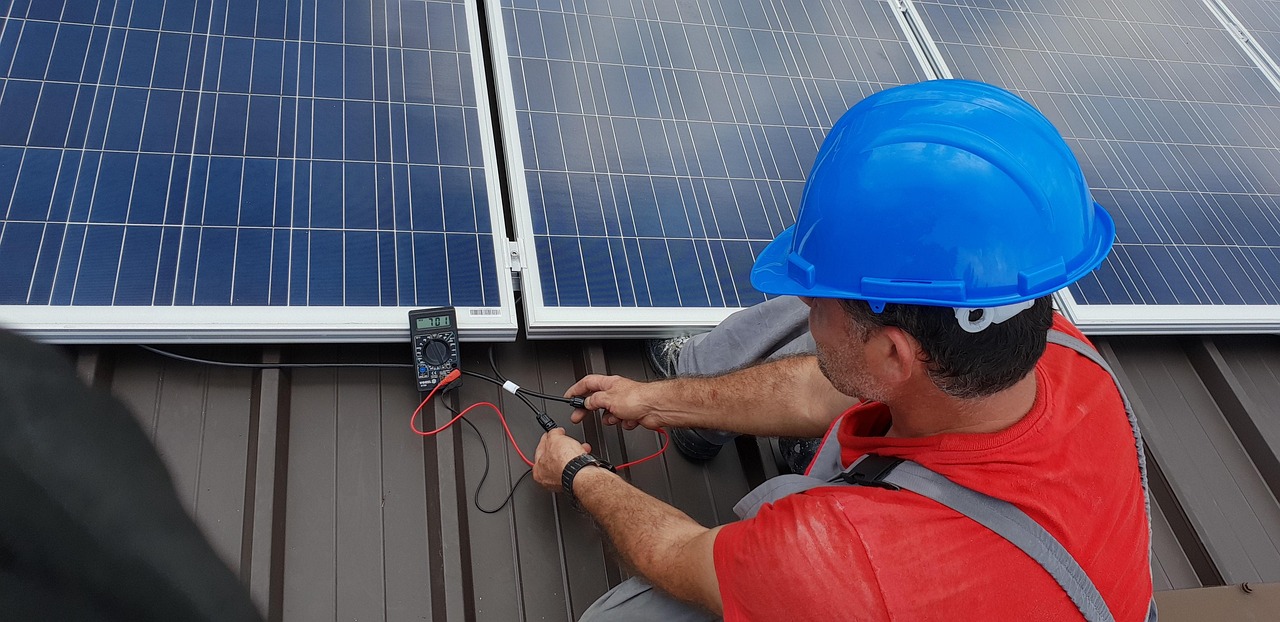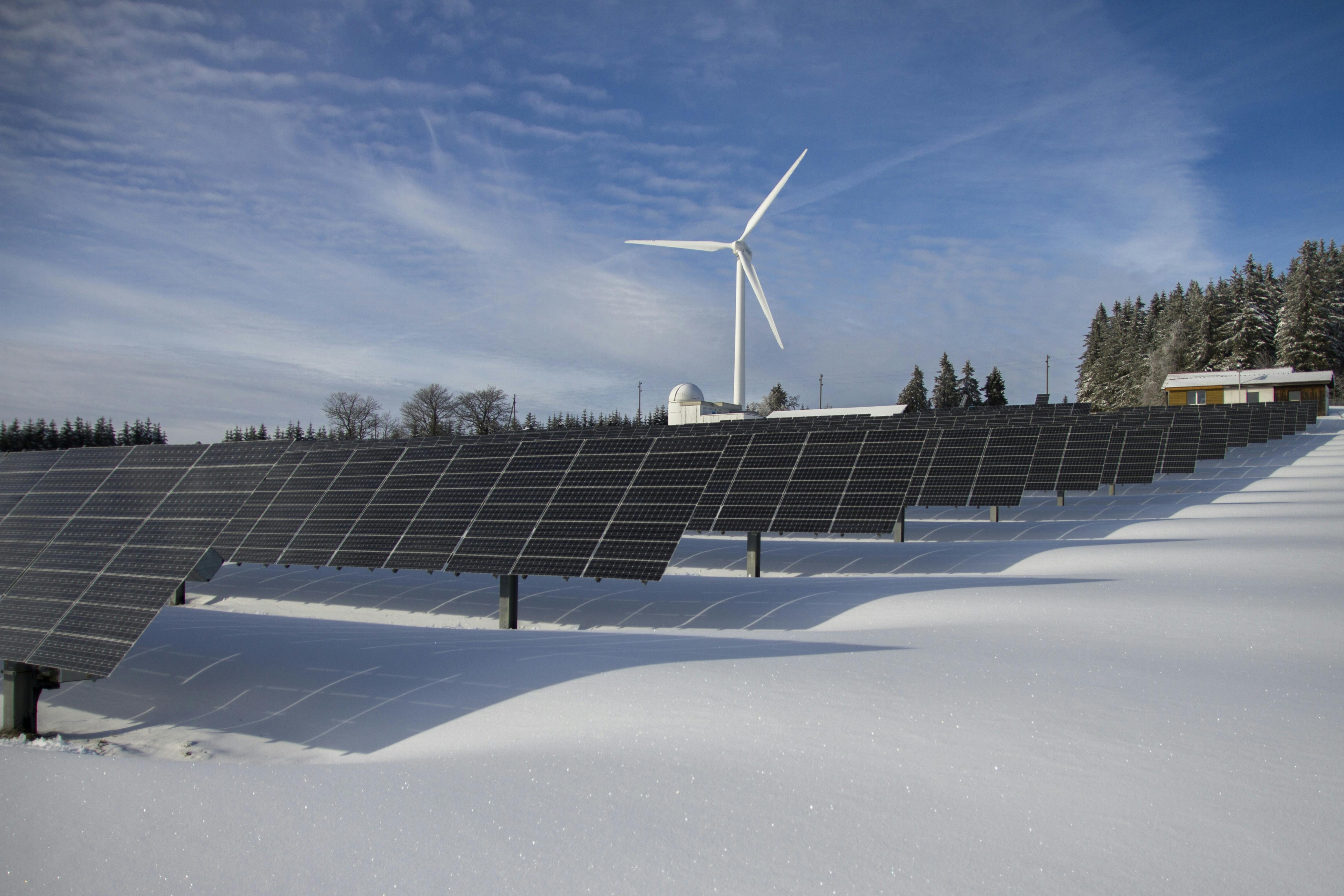A Complete Guide to Renewable Energy Project Management
Master renewable energy project management with proven strategies that drive real results.

Mastering the Financial Landscape of Renewable Projects

Managing the finances of renewable energy projects requires a different approach compared to traditional energy ventures. The main challenge? Higher upfront costs and longer payback periods often make investors hesitant. Yet experienced project managers know how to build solid financial plans that pay off in the long run.
Key Takeaways:
- Renewable project success depends on strong financial planning, risk management, and technical execution.
- Combine diverse funding sources and government incentives to manage upfront costs and attract investors.
- Stay compliant by understanding local regulations and keeping clear communication with authorities.
- Focus on efficient design, reliable grid integration, and energy storage to maximise performance.
Strategic Financing
Getting funding for renewable projects comes down to having the right approach. Here's what successful managers do to attract investors:
- Build a Clear Business Case: Use real data and detailed projections to show investors exactly how they'll get returns over time
- Mix Up Funding Sources: Don't rely on just one source - combine private investment, bonds, and other options. Recent studies show that 40% of renewable projects succeed by using multiple funding types
- Use Government Support: Take advantage of available tax breaks, grants and special rates that help offset initial costs. These programs make renewable projects more appealing to cautious investors. Learn more about current incentives at World Wide Recruitment Energy Statistics.
Risk Management in Volatile Markets
Smart financial planning means carefully weighing opportunities against risks. Start with a detailed risk assessment, then keep tabs on market changes. Using long-term contracts helps lock in stable prices and income. Timing is also key - planning major expenses around market cycles can save significant costs.
Frameworks for Effective Financial Planning
Success in renewable energy requires a strong financial foundation. Here are the essential steps:
- Cash Flow Planning: Map out detailed income and expense forecasts that account for potential problems
- Return Tracking: Keep ROI calculations current as markets and technology change
- Keep Stakeholders Involved: Regular updates and input from stakeholders helps maintain trust and support
When project managers master these financial basics, they can overcome initial hurdles and set up projects for long-term success. Finding diverse funding while staying flexible with strategy helps renewable projects become a reliable part of our energy mix. For more financing guidance, check out Make My House Green's financing guide.
Navigating Complex Regulatory Frameworks with Confidence

Managing renewable energy projects requires a solid grasp of regulatory frameworks at every stage. These rules and policies shape how projects move forward, creating both hurdles and opportunities along the way. Smart project managers know that compliance goes beyond just following rules - it means staying ahead of changes to keep projects running smoothly.
Strategic Approaches to Regulatory Challenges
To handle regulations across different regions effectively, project managers should focus on these key areas:
- Understand Local Rules: Get to know both regional and national regulations inside and out, since they often vary by location
- Environmental Studies: Complete thorough environmental impact assessments early to spot and address potential issues
- Building Permits: Secure and maintain all needed construction permits to avoid delays
Working across different regions requires flexibility and deep knowledge of each area's rules. As shown in this detailed guide, getting permits means adapting to local requirements, especially when working with teams in multiple countries.
Building Relationships and Compliance Systems
Strong connections with regulatory officials make a big difference:
- Start Early: Build good working relationships with regulators from day one
- Stay in Touch: Keep communication channels open to quickly handle any issues
- Track Everything: Use robust systems to manage compliance tasks and deadlines
These steps help create a buffer against unexpected rule changes while keeping all documentation ready for auditor reviews.
Anticipating Regulatory Changes
Smart project managers stay ready for new regulations by:
- Regular Updates: Keep the team current on regulatory changes through ongoing training
- Clear Records: Maintain detailed documentation that satisfies both auditors and inspectors
- Future Planning: Map out how potential rule changes could affect project timing and costs
Taking time to plan ahead and think strategically helps projects succeed even as regulations evolve. By staying informed and taking action early, project managers can turn regulatory challenges into chances to build stronger, more stable projects.
Technical Implementation That Delivers Real Results

Making a renewable energy system work requires detailed hands-on expertise, not just theory. The key is effective technical implementation - carefully managing each step from planning to operation. Let's explore the essential technical aspects that determine whether a project succeeds or struggles.
System Design Optimization
Getting the design right from the start makes all the difference. This means precisely calculating energy needs and choosing equipment that fits the specific situation. A commercial solar installation needs very different planning than a home system, for instance. Key factors include measuring available sunlight, space constraints, and local building codes. The goal is creating an efficient layout that produces maximum power while keeping maintenance simple. Taking time to optimize these elements helps ensure the project pays off financially.
Grid Integration: Making it Work
Connecting new renewable power sources to existing electrical grids brings some tricky technical hurdles. The main challenge is dealing with the natural ups and downs of solar and wind power output. Project teams need to use advanced tools to predict and manage these variations. This often involves combining different renewable sources and adding storage systems to maintain reliable power. Learn more about smart grid integration here: Energy grid integration strategies.
Innovative Storage Solutions: Enhancing Performance
Having good energy storage is crucial for getting the most from renewable power. Storage systems save extra energy produced during peak times so it's available when generation drops. This creates steady, dependable power even when conditions aren't ideal for generation. Battery systems have become a popular choice since they offer flexibility and efficiency. Other options like pumped hydro storage or thermal storage may work better for certain projects. Picking the right storage approach is key for optimal system performance and good financial returns.
Monitoring Systems and Long-Term Operational Success
Using thorough monitoring systems helps track how well everything is working and catch potential problems early. Real-time data shows exactly how much power is being generated, used, and stored at any time. This information guides maintenance and adjustments to keep the system running smoothly. Good monitoring also provides valuable insights for planning future projects. Teams can study actual performance data to keep improving system designs and make each new installation better than the last.
Strategic Planning and Risk Management That Works

The success of renewable energy projects depends on turning challenges into opportunities through solid strategic planning and risk management. When done right, these two key processes work together to keep projects on track, use resources efficiently, and address potential issues before they become problems.
Timeline Development and Resource Allocation
A well-structured timeline forms the foundation for project success. This means breaking down the entire project into concrete, measurable tasks with clear start and end dates. Each phase needs the right people and materials at the right time - from securing permits to completing construction.
For instance, scheduling skilled technicians for complex installation work requires careful coordination to prevent delays. The goal is to map out these requirements in detail beforehand, so teams can smoothly move from one phase to the next without costly interruptions.
Risk Assessment and Mitigation in Renewable Energy Projects
Renewable projects face specific challenges like weather impacts on solar and wind generation or supply chain delays affecting equipment delivery. The key is spotting these risks early by examining every project stage from initial studies through final testing.
Once potential issues are identified, managers can put safeguards in place. This might mean having backup suppliers, factoring weather forecasts into schedules, or creating clear protocols for handling unexpected problems. Taking these steps early helps minimize disruptions later.
Contingency Planning and Stakeholder Management
Even with careful planning, issues can still arise. That's why having contingency plans ready is essential. These backup plans should outline specific steps, responsibilities and resources needed to handle common problems like equipment issues or permit delays.
Keeping stakeholders informed is equally important throughout the project. Regular updates about progress, challenges and any changes to plans helps maintain trust and alignment. When everyone understands what's happening and why, it's easier to work together toward project goals.
Implementing Effective Monitoring Systems
Catching small issues before they grow requires good monitoring systems. These tools track important metrics in real-time - from energy production to equipment performance to weather conditions. The data helps spot potential problems early.
For example, if output starts dropping or certain components show signs of wear, teams can investigate and fix issues quickly. This data-driven approach lets managers make informed decisions to keep projects moving forward successfully. Regular monitoring ensures projects stay on budget and meet their targets for clean energy generation.
Real-World Success Stories and Implementation Insights
Looking at successful renewable energy projects reveals key strategies for project managers. Take Australia's Large-scale Renewable Energy Target (LRET) program. By January 2021, Australia hit an impressive milestone - generating over 33,000 gigawatt hours (GWh) of new renewable energy over 12 months. This required adding about 6,400 megawatts of fresh capacity, with special focus on expanding solar power projects. The results show what focused planning and strong execution can achieve. See the full performance data here.
Insights from Successful Renewable Energy Projects
The most effective renewable energy projects tend to share several key management practices:
- Clear Planning Process: Top projects start with detailed planning that considers environmental impact, funding needs, and technical requirements from day one
- Strong Communication: Getting all stakeholders involved early and keeping them updated regularly helps prevent issues and keeps projects moving forward
- Flexibility: Using real-world performance data to adjust plans ensures projects stay aligned with goals as conditions change
Overcoming Common Challenges
Every project faces obstacles along the way. The key is spotting potential issues early and having plans to address them. Common challenges include:
- Managing Resources: Success requires careful scheduling and allocation of people, equipment and funding throughout the project lifecycle
- Following Regulations: Projects need to meet local, national and international requirements without causing delays or cost overruns
- Handling Problems: Having backup plans ready helps teams respond quickly when unexpected issues come up
Looking at how successful projects handle these challenges provides valuable lessons for planning new initiatives.
Practical Takeaways for Your Projects
Here are specific strategies you can apply to your renewable energy projects:
- Build in Flexibility: Create processes that let you quickly adjust plans as needed during both planning and implementation
- Use Advanced Tools: Implement current forecasting and management systems to optimize energy production and storage
- Focus on Relationships: Regular updates to all stakeholders, including government agencies, helps maintain project momentum
The success of programs like Australia's LRET shows what's possible with good planning and execution. Want to learn more about maximizing returns on renewable energy? Read our guide on solar panel ROI.
Future-Proofing Your Project Management Approach
Managing renewable energy projects requires staying ahead of continuous changes in technology, regulations, and market conditions. Success depends on building adaptable systems and processes that can evolve alongside industry developments. Here's how to create a resilient approach that will serve you well into the future.
Adapting to a Dynamic Landscape
The renewable energy sector shifts frequently due to new policies, advancing technology, and changing energy demands. For example, when governments adjust solar incentive programs, it directly impacts project economics and financing options. Project managers need to stay current on policy changes and maintain flexibility in their planning. Building adaptable strategies helps teams respond quickly when conditions change.
Embracing Technological Advancements
New developments in materials, energy storage, and grid technologies create both opportunities and challenges. Project teams must carefully evaluate which innovations provide real value for their specific needs. This could mean adopting specialized project management software, exploring emerging battery solutions, or preparing for smart grid integration. For more on new technology adoption, see our guide on Electric Vehicle Chargers.
Managing Evolving Stakeholder Expectations
Modern renewable energy projects involve diverse stakeholder groups with growing expectations. Environmental, social, and governance (ESG) factors now influence investor decisions. Local communities want meaningful involvement, while customers expect transparency throughout the process. Success requires clear communication, genuine community engagement, and following through on sustainability commitments.
Building Resilient Project Frameworks
Creating durable project management systems means developing:
- Strong risk management: Identifying potential issues early and having mitigation plans ready
- Flexible methodologies: Using agile approaches that can adapt as requirements change
- Continuous improvement: Regular evaluation of processes and incorporation of lessons learned
Project teams that embrace change while maintaining core best practices position themselves for long-term success in renewable energy development.
Want to explore solar options for your property? Visit MakeMyHouseGreen to learn about solutions that fit your needs.
Ready to see what you can save?
Our solar calculator is 100% free to use. Enter your postcode below to get started.

Based on 400+ Trustpilot reviews






